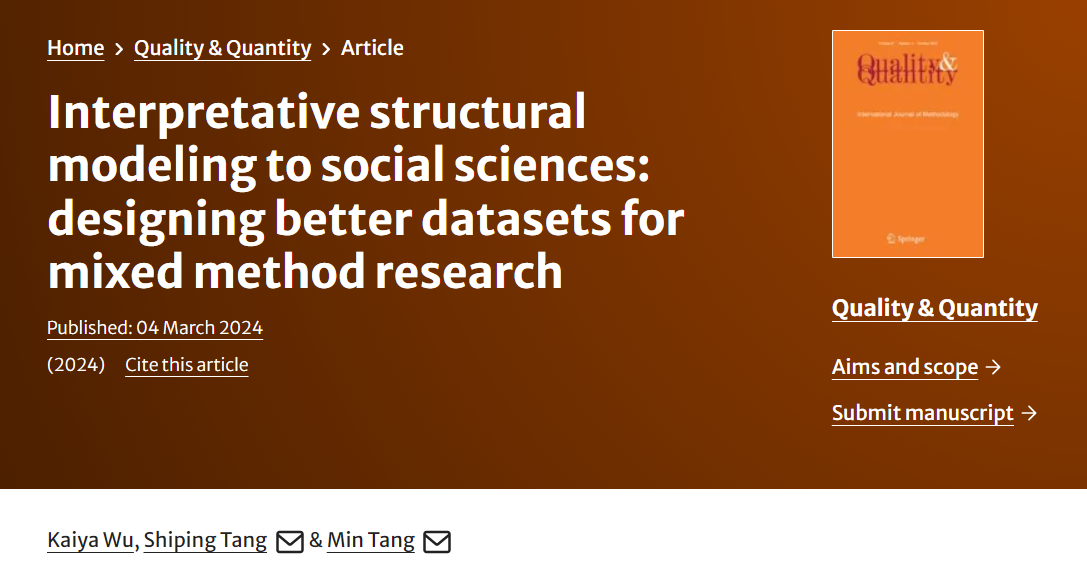吴开亚、唐世平、唐敏:社会科学中的解释结构模型
按语:实证社会科学中的复杂数据集越来越多,但数据质量是否可靠却未可知。如果数据质量堪忧,不仅意味着研究者在收集阶段已经浪费了大量人力财力,同时还会对基于这些数据进行的实证分析产生负面影响。那么,我们是否能够在数据收集之前,找到方法来确保或提高数据的质量?
复旦大学吴开亚教授和唐世平教授,以及上海财经大学唐敏教授合著文章 Interpretative Structural Modeling to Social Sciences: Designing Better Datasets for Mixed Method Research 即围绕以上展开。文章把系统科学中的解释结构模型法(Interpretative Structural Modeling, ISM)跟社会科学的“概念分析(conceptual analysis)”以及数据相结合,指出了 ISM 通过更好地设计数据集,在改善数据质量方面所起的重要作用。文章于2024年3月4日发表于 Quality & Quantity。

Abstract: The multiplication of complex datasets in empirical social sciences calls for methods that can improve the design of complex datasets before the actual gathering of data. Yet mainstream scholars in related fields have rarely explored such methods. In this study, we introduce Interpretive Structural Modeling (ISM) as such a method. As a mixed method, ISM integrates Boolean algebra, matrix theory, and directed graph theory to impose a formal structure to qualitative understanding of a complex system. ISM’s final output is a directed graph that can be visually and easily interpreted. We show that ISM can structure indicators graphically into a multilayered and multi-blocked model, thus uncovering hidden interactions among indicators. By doing so, ISM can reveal hidden and undesired redundancies and incoherencies among indicators within a complex dataset. Most critically, ISM achieves these goals without relying on statistical analysis and hence before the actual gathering of any data. Deploying ISM when designing complex datasets thus facilitates more rigorous conceptualization and understanding of complex social phenomena, steers us away from badly designed complex datasets, and saves precious resource. We use ISM to probe several complex datasets to demonstrate its potentials.
Keywords: Dataset design; Interpretive structural modeling; Mixed-method research; Conceptualization
Authors: Kaiya Wu, Fudan University; Shiping Tang, Fudan University; Min Tang, Shanghai University of Finance and Economics
Published: Quality & Quantity, 04 March 2024
Access: https://link.springer.com/article/10.1007/s11135-024-01838-5
Citation: Wu, K., Tang, S. & Tang, M. Interpretative structural modeling to social sciences: designing better datasets for mixed method research. Qual Quant (2024). https://doi.org/10.1007/s11135-024-01838-5
特别说明
- 复旦大学“复杂决策分析中心”研究团队成员武轲和刘辰辉,针对ISM的矩阵运算开发了Java和Python程序包,将ISM的矩阵运算完全自动化以便研究人员使用。程序已于ISM Paper GitHub仓库开源。
- 原文可至Springer Link页面阅读或下载。
复旦大学“复杂决策分析中心”简介
复旦大学“复杂决策分析中心”成立于2013年,是我国第一个基于“计算社会科学”,专门为国家战略决策提供技术支持的研究中心。中心立足社会科学研究方法和问题前沿,直面变化与复杂的世界,旨在建立起一套基于广泛而丰富的历史经验和科学方法的分析框架、模型和工作软件,将前沿的社会科学研究方法与实际的学术和政策研究结合起来;把战略行为和战略决策研究的经验一般化、模型化,做到可复制、可移植。通过改进或整合既有的技术平台,开发新的技术平台,成为国家战略决策的技术支持中心,为我国的战略分析和决策提供技术支持。
中心的成立得到了来自国家多个重要部门和机构的支持。从2016年起,完全抛开民意调查,而是基于计算机模拟仿真技术,中心的团队已经连续五次精准预测了美国和我国台湾地区的选举结果。中心还开发了多款针对其它复杂决策问题的计算模拟预测平台。
唐世平教授简介
复旦大学“复杂决策分析中心”主任唐世平教授,是复旦大学特聘教授、教育部“长江学者”特聘教授、国际研究协会(ISA)副主席。作为当代中国最具国际影响的社会科学家之一,他在多个领域均有广泛丰硕的成果。迄今为止,他已出版五部英文专著、三部中文专著、一部英文编著和三部中文编著。其中,Social Evolution of International Politics (《国际政治的社会演化》,牛津大学出版社,2013年)于2015年荣获 ISA “年度最佳著作奖”,是亚洲和中国首位获此殊荣的学者。他的第五部英文专著The Institutional Foundation of Economic Development(《经济发展的制度基础》)于2022年在普林斯顿大学出版社出版。他也是多个国际顶级和一流刊物的第一位来自中国的编委会成员。唐世平教授是中国计算社会科学、特别是决策计算的拓荒者之一,他提出了基于“全数据计算”(total data computation)的“决策计算社会科学”理念。
